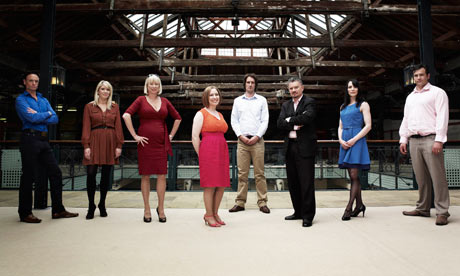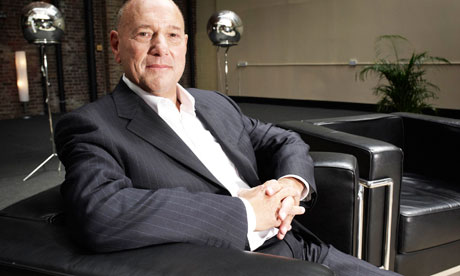Some of these jobseekers have experienced serious mental health issues. But can an employment panel identify them?
A radical Channel 4 series
aims to change negative assumptions about mental illness.
Article by Amelia Gentleman

Amelia Gentlemanguardian.co.uk,
Monday 16 July 2012 20.00 BST

The job candidates line up for Channel 4’s World’s Maddest Job Interview,
part of its 4 Goes Mad season. Photograph: Channel 4
There's a moment in Channel 4's World's Maddest Job Interview where three employers pause and consider whether they would like to give a job to someone who has repeatedly felt suicidal.
"You'd want to work with someone who has depression, something I as a layman would think of as an illness that can be controlled and managed, but something like suicide … that's so on the edge, so serious that I wouldn't really know how to cope with it at all," Claude Littner, a colleague of Lord Sugar, who has appeared as an interviewer on The Apprentice, says, before concluding firmly: "I would be sad for them and I would not employ them."
The twist in this show is that Littner doesn't know which of the eight potential employees that he spends five days interviewing has been suicidal, nor which one has hidden a chronic mental health condition for the past 30 years, nor which one has spent eight months sectioned in a psychiatric unit, leaving the ward every morning in a suit to go to work. Viewers are invited to make their own judgment, as they watch potential employers and psychiatrists observe candidates and try to determine who is the most employable, without any knowledge of their health history.
Channel 4 Goes Mad begins next week, hoping to get a mass audience engaged in thinking about the nature of mental health problems. Throughout the week eight volunteers will appear in Channel 4's most popular primetime programmes, from Come Dine With Me to Location, Location, Location; some of the eight have serious mental health conditions, some of them have none.
At the end of the week all eight will be brought together in World's Maddest Job Interview, where employers will assess them to decide who make the most attractive employees. The conclusions of the programme remain a secret, but in the end the interviewers found many of those with mental health conditions to be very appealing prospective staff members. The psychiatrist and psychologist who were observing the process were not always able to tell who had been diagnosed with some form of mental health disorder in their past.
Camilla Lewis, executive producer of the series, says the programmes are about forcing mainstream audiences to think about an issue that affects one in four people, but that remains a huge taboo. They focused on the workplace, because discrimination around mental health at work is a particularly persistent problem. She shied away from documentary, because she wanted to attract bigger numbers to confront the issues.
"We asked: how can we get the most difficult message told in the most popular way?" she says. "We were keen to make sure we get the widest impact to make sure that not just a few people watch it, the few people who were already enlightened. We're playing deliberately on the grammar of reality television. It feels a touch Big Brother, a touch Apprentice, it's got hints and overtones of Dragon's Den in it. That's deliberate because we want to play on that grammar to engage the largest audience we can."
Determined to push the issue into mainstream viewing, she persuaded the channel to infiltrate the eight stars of World's Maddest Job Interview, into Countdown, Million Pound Drop and Superscrimpers, among other C4 programmes. The volunteers will be "hiding in plain view throughout the week in the programmes", she says. She isn't sure yet precisely what the promotional trail says, but thinks it will run along these lines: "Some of these people have had very serious mental health conditions. Can you tell by looking at them?"
"We play along with the popular sense of: 'Can I tell by looking at someone what their mental health condition is?' To which the answer is, as the programme proves quite clearly, No."

Claude Littner, who interviews the job candidates in
Channel 4’s World’s Maddest Job Interview. Photograph: Channel 4
Channel 4 has caused controversy a couple of times recently by appearing to engage with difficult themes – Travellers and disability, for example – and ending up accused of insensitive handling of its subjects and "crass branding" when My Big Fat Gypsy Wedding and The Undateables were aired. It is hard to tell from the very rough preliminary edit sent by the programme-makers Cineflix how sensitively the issues will be handled, but both Lewis and Alessandra Lemma, psychologist and psychoanalyst professor at the Tavistock and Portman care centre, who appears on the programme and advised on its creation, are passionate about the issues they want to highlight and adamant that the volunteers have been treated with care and respect.
"If my programme makes you consider what a mental health issue looks like and how it manifests itself, then that will have been the most powerful thing that I have done. There's a real opportunity here to make you see the person and not the condition. If we've used tabloid mechanisms to do that, then we're clever," Lewis says.
Lemma says she hopes the programme will help people "consider their prejudices". "The prospect of losing control over one's own mind is terrifying, and therefore one way of dealing with that is to create a distance, a barrier, an us-and-them mentality which allows us to protect ourselves from having to contemplate the possibility that this could happen to us. It feeds into prejudice, because prejudice is born out of fear of that which we don't want to know about," she says.
"The individuals who took part in the programme had had very serious mental health conditions; these were not people who were just mildly depressed. We had individuals who had been admitted to hospital for very long stretches of time, people who had self-harmed, someone who had lived with a serious mental health problem for 30 years, but all of them had managed to work, to maintain families and relationships. What they demonstrate is that we can carry inside our minds a terrible turmoil, that this doesn't mean we can't function as good citizens and colleagues at work," she says.
One of the volunteers (who can't be named, or the surprise gets spoiled) had bulimia for 32 years, but never told her employers, and has held down a high-powered position. Relatively recently she discovered a way of ridding herself of bulimia, and has been free of the condition for the past two years. She wanted to appear on the programme because she thought she would never get completely over it, and wanted to show that it was possible to recover from the condition. Another volunteer who spent eight months on a psychiatric ward, away from his family, but who still managed to get dressed in a suit and go to work every morning, said he hoped the programme "will change perceptions".
Lemma says: "One of the things that I hope the programme conveys is that there is a continuum between emotional distress which we all experience ... at some stage in all of our lives we will have periods of stress and strain, that are on a continuum to eventually, on the other end, getting a formal diagnosis of depression or OCD. We talk about the one-in-four statistic, but the one-in-one statistic is very important too. That's an important message to get across as we try to destigmatise mental illness – to see that these things are in all of us to different degrees, and different life events may trigger in us different reactions."
At the end of the programme, there are tears as someone who has had a severe mental health condition since she was five is told by psychiatrists that they can't spot anything in her behaviour and by employers that they rank her as highly employable. But one employer still admits that if he had simply been told in an interview the bare facts about her illness, he would have had "serious concerns" about employing her.
It is clear that finding the correct moment to reveal a history of mental illness is not easy and huge stigma remains. But mental health charities are happy that the subject will be tackled on primetime television.
"We know people think like this, and that discrimination happens," says Kate Stringer, from Time to Change, the mental health anti-stigma programme run by Mind and Rethink Mental Illness, which advised the programme-makers.
"We would like people watching to realise that some of the assumptions that they make about mental health are incorrect, that it doesn't stop you from being perfectly employable."
The World's Maddest Job Interview is on
UK. C4, Wednesday 25 July at 10pm.
The 4 Goes Mad season starts on Monday 23 July.
For advice UK: samaritans.org (08457 90 90 90)
English: Recommended by Business Doctors, Graz; Austria: www.Business-doctors.at
Deutsch: Buch link:
"Don't Panic: Du bist nicht allein"
http://stress-burnout-dont-panic.blogspot.com/
Wichtiger Hinweis:
Diese Seite enthält nur allgemeine Hinweise und darf nicht zur Selbstdiagnose oder -behandlung verwendet werden. Sie kann einen Arztbesuch nicht ersetzen. Die Beantwortung individueller Fragen durch unsere Experten: email: office@business-doctors.at
TWITTER... Follow @PreventBurnout Tweet
NEWSVINE...
FACEBOOK...
Keine Kommentare:
Kommentar veröffentlichen